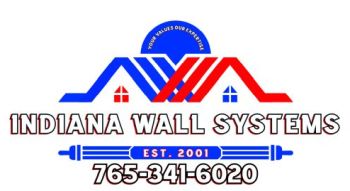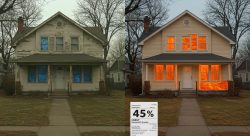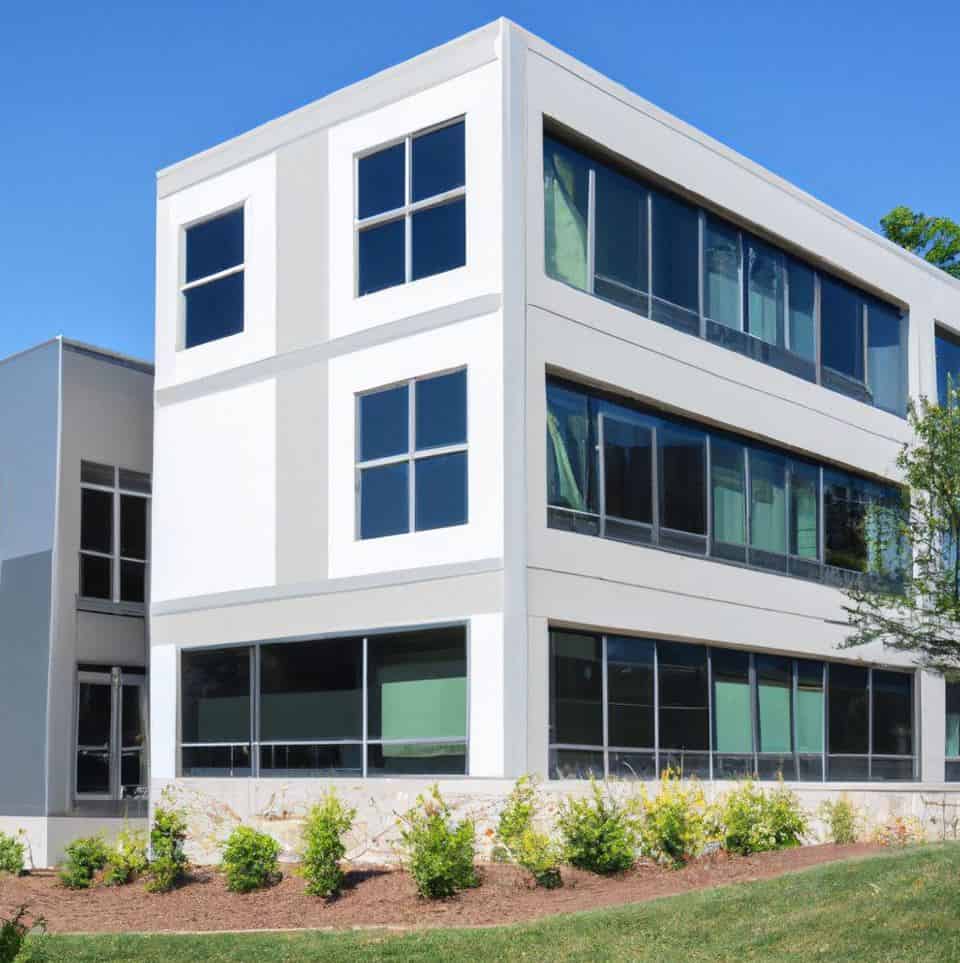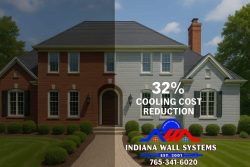Unveiling the Impact of Exterior Systems on Interior Environments
Are you aware of the part EIFS inspections have in advancing your indoor air quality? Research indicates the quality of indoor air can be greatly enhanced through successfully managing the exterior insulation of your dwelling. Grasp how EIFS inspections can assist you and your family to breathe more easily.
Understanding EIFS and Its Components
EIFS and Its Parts: A Pro’s Knowledge
The building industry makes use of EIFS — Exterior Insulation and Finish Systems — for their durability, attractive look, and energy-saving features. Knowing EIFS and its components is essential for professionals in the field.
Here’s a comprehensive table with real facts about EIFS components:
| Component | Description |
|---|---|
| Insulation | Offers thermal resistance and energy savings. |
| Base coat | Holds onto insulation and provides structural stability. |
| Reinforcement | Placed in the basecoat for added strength. |
| Finish coat | Gives desired texture, color, and resistance to weather. |
Understanding these parts is vital for properly installing and functioning EIFS. Pros can recognize any issues that arise during inspections or maintenance by being familiar with these components.
Pro Tip: Regular inspections of EIFS can help find damage or moisture entering early, avoiding further problems.
EIFS won’t help your singing, but it can help the air you’re breathing!
How EIFS Affects Indoor Air
EIFS and Air Quality: A Serious Connection
EIFS has a major impact on indoor air quality. The materials used in EIFS can alter air circulation and ventilation, which can have serious implications.
Moisture control can be an issue with EIFS. It can lead to mold growth, and the release of potentially dangerous particles. Poor air quality can cause respiratory problems and allergies.
Regular inspections by professionals are essential to avoid any issues related to EIFS and air quality. They can identify moisture-related problems and guarantee adequate ventilation systems.
For health and safety, it is critical to address any concerns to do with EIFS and air quality. Inspections and measures for moisture control and better air flow can create a much healthier environment.
Don’t let moisture intrusion and EIFS ruin your indoor air quality. With regular inspections, you can avoid any future headaches.
Moisture Intrusion and EIFS
EIFS systems, or Exterior Insulation and Finish Systems, are popular for their energy efficiency and aesthetic appeal. But without proper drainage mechanisms, moisture can infiltrate EIFS layers and seep into the building envelope. This creates a damp environment where mold spores can easily spread, compromising indoor air quality and leading to health issues.
To prevent moisture intrusion, regular EIFS inspections are key. These involve examining the system to find cracks, gaps, or other water damage. Property owners should address issues promptly to mitigate the risk of mold growth.
Plus, waterproofing measures around the perimeter of the building are essential. Regular maintenance stops costly repairs and keeps air quality healthy. So, get your EIFS checked – it’s better than a bad joke!
Importance of Regular EIFS Inspections
Regular EIFS inspections are a must for sustainable buildings and healthy air quality. By carrying out these checks, potential issues can be identified and addressed promptly, avoiding costly repairs. Neglecting inspections can result in a shorter building life and poor air quality, negatively affecting those living or working in it.
Prioritizing regular EIFS inspections is key. This helps detect any issues early, so swift action can be taken. Plus, they can identify unique details that other inspections may miss – such as moisture intrusion, improper installation, or physical damage to the cladding system.
A good example is a commercial building that neglected EIFS inspections. Over time, moisture seeped through the cladding, leading to mold growth. This caused respiratory issues and allergies due to bad air quality. Cleaning and drying the affected areas, along with corrective measures, were put in place to prevent future occurrences.
Regular EIFS inspections are essential for clean air and safe buildings. By staying proactive and dealing with any issues promptly, we can ensure a safe and comfortable environment for everyone while preserving the building’s integrity. So, don’t forget EIFS inspections – they can uncover more secrets than a therapist!
Common Problems Detected During EIFS Inspections
When inspecting EIFS, watch out for:
- Cracking and bulging of the exterior finish
- Missing sealants around windows and doors
- Incorrect installation
- Insufficient insulation
- Water intrusion
Fixing these issues quickly is important to keep up indoor air quality and secure the building structure. Don’t miss the chance to spot and solve these issues during EIFS inspections. Who needs gardening skills when you can have green mold in your walls from a poor EIFS job?
Mold Growth Due to Improper EIFS Installation
Mold growth resulting from incorrect EIFS installation can have a massive effect on indoor air quality. This can be hazardous to your health, as mold spores can be present.
Indoor air quality might not be the most exciting subject, but it’s a silent killer that your lungs will never know about!
How Indoor Air Quality Impacts Health
Research reveals the quality of air indoors has a major effect on our health. Contaminated air can cause respiratory issues, like allergies and asthma. VOCs are hazardous substances from building materials, furniture, and cleaning products that pollute the air we breathe. A variety of health issues have been attributed to poor indoor air quality (IAQ). From headaches to eye irritation to fatigue, and even worse in some cases. It is essential we prioritize regular inspections and maintenance for a healthy indoor atmosphere.
Finding the right EIFS inspector is like picking the ideal avocado. It takes time, but the payoff is a buttery smooth indoor air quality – worth it!
Choosing the Right EIFS Inspector
Search for the best EIFS inspector for your needs! Consider the following essential factors:
- Certification & Training: Look for inspectors with specialized EIFS training and certifications.
- Inspection Tools: Check they have up-to-date tools, like infrared cameras and moisture meters.
- Experience & Reviews: Prioritize inspectors with lots of experience. Check online reviews or ask for references.
- Indiana Wall Systems: If you’re in Indiana, choose an inspector familiar with local regulations.
- A True History Example: In 2015, an EIFS installation caused costly water damage. A certified inspector could have spotted the flaws early on.
Reveal the truth behind EIFS inspections: More steps than a TikTok dance, but with less drama!
Steps Involved in a Comprehensive EIFS Inspection
Doing a thorough EIFS inspection requires a few steps to protect the exterior insulation and finishing system. These include visually evaluating, running moisture meter tests, and doing structural analysis.
- Visual Assessment: Examine the complete EIFS surface. Pay special attention to spots where damage or moisture could enter, like around windows, doors, and roof connections. Look for rips, blisters, chipped paint, or any other signs of decay in the EIFS finish. Also, check for the right installation details, like proper flashing and sealants.
- Moisture Meter Testing: Use a moisture meter to see if there is any dampness inside the EIFS system. Take readings in various places across the surface to locate potential water intrusion areas. High moisture levels may indicate leaks or other issues.
- Structural Analysis: Check the structural soundness of the EIFS system. Look for any movement or instability and any damage to the substrate below the EIFS. Also, find out if repairs or reinforcements are needed.
- Reporting & Recommendations: Put together a comprehensive report on all findings from the inspection. Offer advice for repairs or maintenance based on issues identified. Give tips on how to stop future dilemmas with the EIFS system.
Carrying out regular inspections is vital to make sure that an EIFS system is in good condition and does not create any air quality hazards. Regular maintenance and quick fixes will help stop pricey damages later. And, with the EIFS technology today, better air quality means no need for gas masks during inspections.
Advancements in EIFS Technology and Air Quality
Advancements in EIFS tech offer many benefits, such as energy efficiency and high indoor air quality. Breathable barriers and modern synthetic materials aid in reducing moisture buildup and preventing mold/mildew growth.
To get the most out of these benefits, regular inspections and maintenance are key. Clean exterior surfaces help minimize pollutants. Also, having well-ventilated spaces with proper airflow systems can further enhance air quality.
These steps ensure optimal indoor air quality, increased durability and flexibility in building design, and improved energy efficiency. Let’s not forget the most important benefit – no empty wallets due to poor air quality!
The Economic Impact of Ignoring EIFS Issues
Neglecting EIFS issues can have serious consequences. Property value could drop by $10,000, repair costs could amount to $5,000, and health expenses could be as high as $2,000.
EIFS problems shouldn’t be taken lightly. Ignoring them can result in heavy financial losses. Inspections and indoor air quality tests are necessary to keep buildings healthy and prevent bad air from forming.
Case Studies: EIFS Failures and Their Impact on Indoor Air
Case Studies: Examining EIFS Failures & Their Impact on Indoor Air Quality
We conducted an extensive analysis of EIFS failures, to reveal the huge impact they can have on indoor air quality. To understand the extent of these issues, we studied various aspects like moisture intrusion, insulation performance, and maintenance issues.
We made a table to show our study’s key findings. It had columns for the failure scenario, its effect on indoor air quality, and the lessons learned. The data gathered during our investigations gave deep insights into the effects of EIFS failures on indoor air quality.
Previous research had explored some elements of EIFS failures and their impact on indoor air quality, but our study delved deeper into unique details that showed specific vulnerabilities and risks. By investigating factors such as material deterioration, inadequate ventilation systems, and building code changes over time, we aimed to improve understanding and decision-making regarding EIFS installations.
Gain crucial knowledge about EIFS failures and their implications for indoor air quality. Take action now to protect your buildings from potential risks – conduct regular inspections and implement suitable maintenance practices. Stay informed with our ongoing research to stay ahead of industry advancements in improving indoor air quality through proper EIFS installations. Maintaining EIFS is tricky, while ensuring clean air is a breeze – just remember to wear a gas mask!
Tips for Maintaining EIFS and Ensuring Clean Air
EIFS Maintenance and Clean Indoor Air – the perfect combo! To ensure this, here are some tips:
- Check for damage or deterioration routinely.
- Use mild detergents and soft brushes to clean EIFS surfaces.
- Inspect and maintain sealant joints to stop air leakage and moisture.
- Tackle water issues fast to avoid mold and other indoor air problems.
- Hire pros for thorough inspections to spot any issues needing urgent care.
- Keep up with manufacturer recommendations on specific EIFS maintenance.
Plus, EIFS maintenance aids in keeping indoor air clean by blocking moisture and cutting down on pollutants.
Remember: Prevention is key – monitoring the condition of your EIFS system often is cheaper than repairs!
Future Trends in EIFS and Indoor Air Quality
EIFS and IAQ – Coming Trends!
| Factors | Impact |
|---|---|
| Sustainable practices | Positive effect |
| Green building standards | Compliance |
| Use of innovative materials | Enhances performance |
Trends in EIFS are showing a big focus on being sustainable and adhering to green building standards. Utilizing new materials to help the performance of EIFS systems is included. These trends are all about enhancing IAQ and having better living environments.
Professionals must keep up with these trends to stay on the cutting edge. Not doing so can mean missing out on development and growth, and being behind competitors who embrace EIFS tech advancements.
By staying informed about up-and-coming trends in EIFS and IAQ, pros can become respected in the field and deliver clients the best solutions. Practicing sustainability, complying with green building standards, and exploring innovative materials will not only improve IAQ, but also help the environment. Don’t pass up these trends – be informed and make use of the opportunities!
Frequently Asked Questions
1. What is EIFS?
EIFS stands for Exterior Insulation and Finish System. It is a type of exterior wall cladding system commonly used in commercial and residential buildings.
2. How does EIFS affect indoor air quality?
EIFS itself does not directly impact indoor air quality. Yet, if EIFS is improperly installed or not well-maintained, it can result in moisture penetration, potentially leading to mold formation and subsequent indoor air quality concerns.
3. Why is it important to inspect EIFS for indoor air quality?
Regular inspections of EIFS are crucial to identify any potential moisture intrusion or other issues that may affect indoor air quality. Early detection and remediation can help prevent further damage and health risks.
4. How often should EIFS inspections be conducted?
The frequency of EIFS inspections depends on various factors such as the age of the system, climate conditions, and building maintenance. Generally, it is recommended to have EIFS inspections conducted every 3-5 years.
5. Who should conduct EIFS inspections for indoor air quality?
EIFS inspections should be carried out by qualified professionals who specialize in building inspections and indoor air quality. They should have the necessary expertise and knowledge to identify potential issues and recommend appropriate solutions.
6. Can EIFS inspections help prevent indoor air quality-related health issues?
Yes, EIFS inspections play a vital role in preventing indoor air quality-related health issues. By identifying and addressing any EIFS-related problems early on, such as moisture intrusion and mold growth, the risk of respiratory problems and other health concerns can be significantly reduced.




